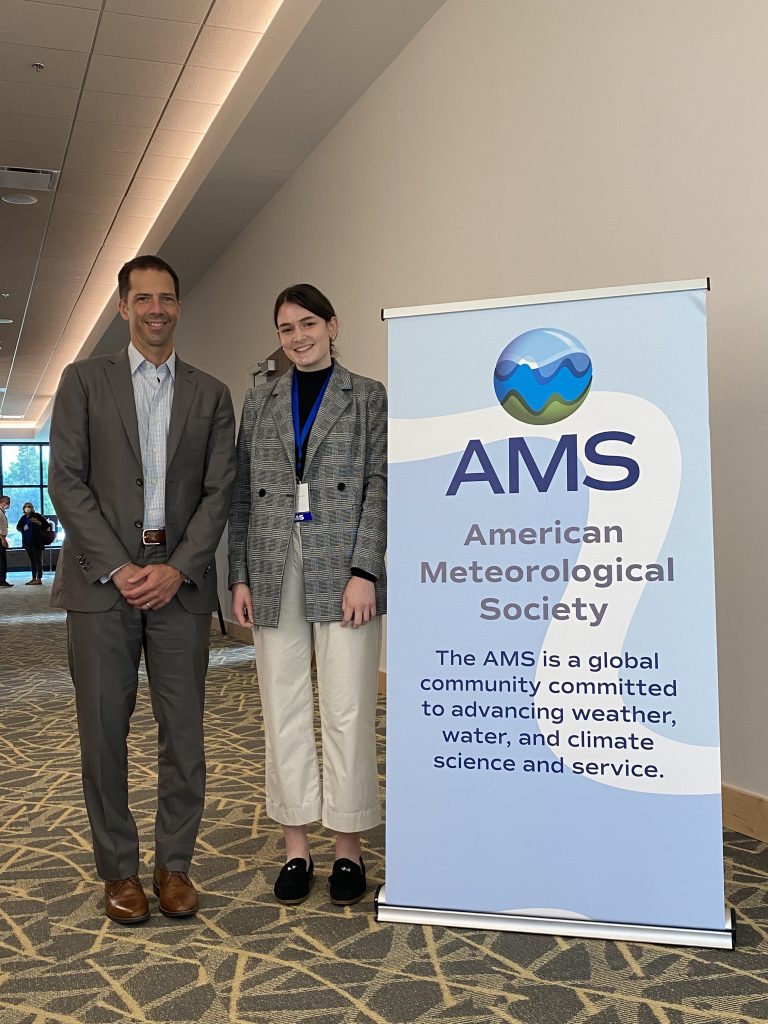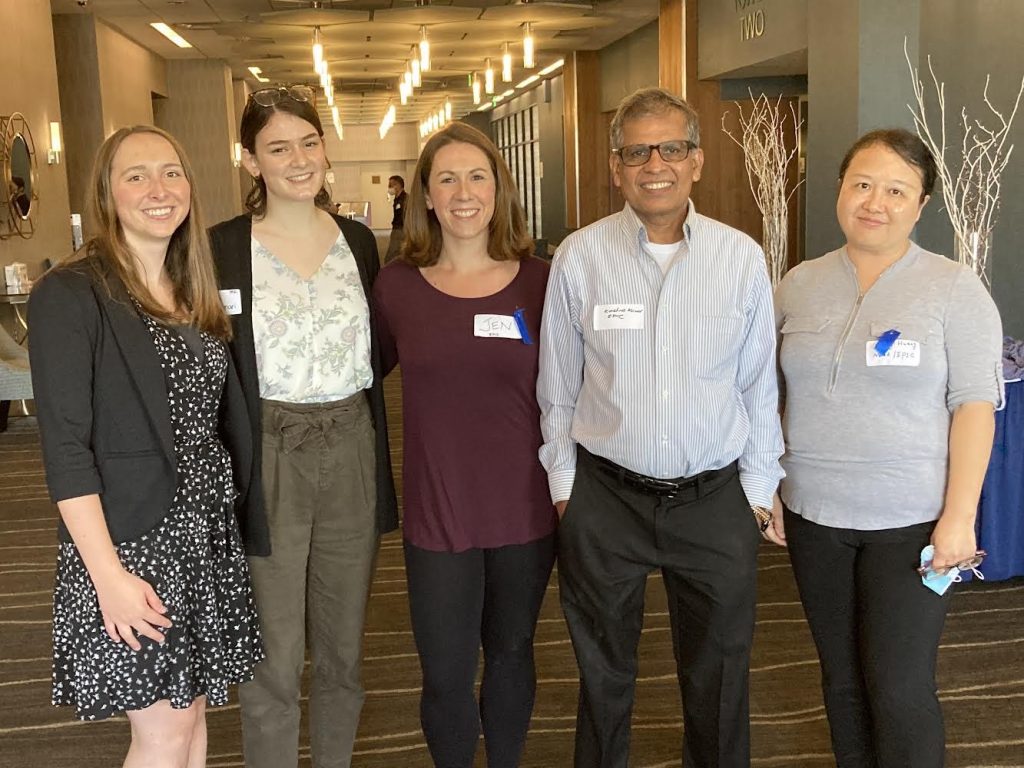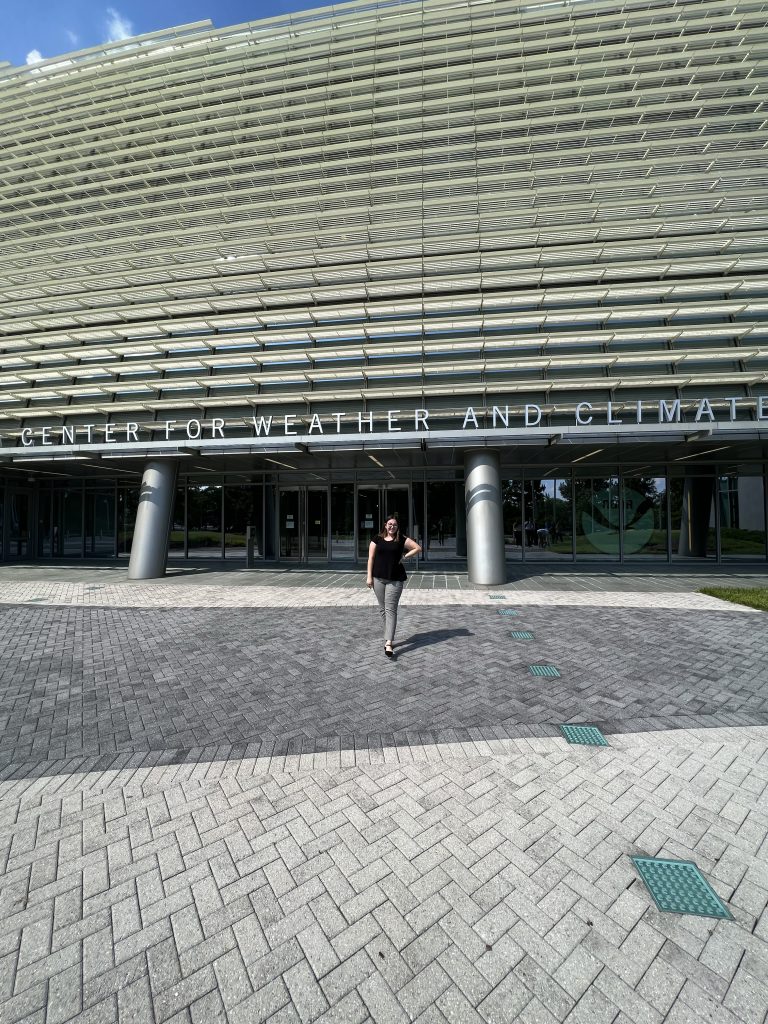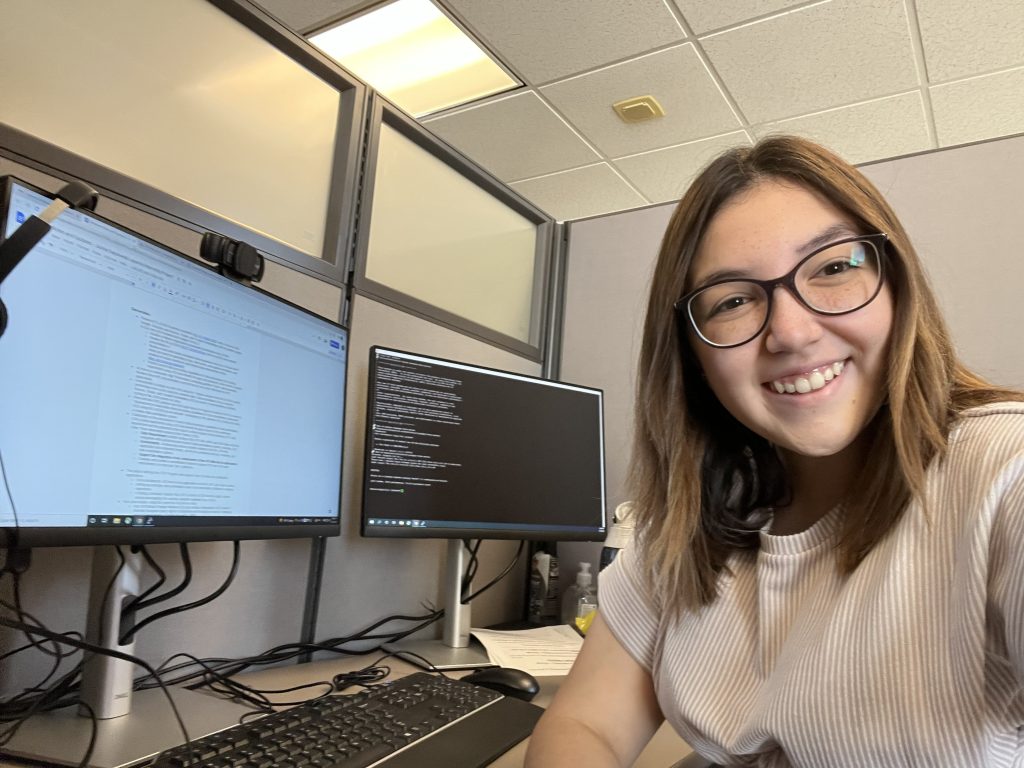This summer, EPIC had the pleasure of working with two Lapenta Interns – Jackie Sepulveda and Ashley Stagnari.
The William M. Lapenta Student Internship Program offers an opportunity for students to work in areas that will provide robust research and/or operational experience that will prepare the them for further study in NOAA fields, for application to fellowships or for the NOAA-mission workforce. This internship program enables the National Weather Service, (NWS), Office of Oceanic and Atmospheric Research (OAR), and National Environmental Satellite Data and Information Service (NESDIS) to target the skills needed to fulfill their specific mission needs.
EPIC wishes the best for Jackie and Ashley – thank you for your excellent work with our program. We look forward seeing what the future has in store for you!
Read more about their experience with the program and team, projects related to the UFS Community, and future plans below:

Ashley Stagnari is a rising Junior at Cornell University majoring in Environment and Sustainability with a concentration in Environmental Policy and Governance and a minor in Climate Change. Her academic interests include climate science and modeling, climate change mitigation policy, and sustainable development;
Ashley seeks to bridge the gap between science and policy in an effort to address the climate crisis. Additionally, Ashley plans to pursue a career in climate change mitigation policy and sustainability consultancy to promote climate activism and awareness in education and legislature. This summer, as part of her commitment to confront environmental challenges, she is working with NOAA’s Earth Prediction Innovation Center on a social science research project centering on the intersection between weather modeling and community engagement. Ashley is drawn to NOAA’s vast array of scientists, research, and environmental and social initiatives that seek to protect the planet for future generations. In her free time, she enjoys reading, nature photography, and volunteering with environmental and humanitarian organizations.
EPIC/William M. Lapenta Internship
Written by Ashley Stagnari
Cornell University, William M. Lapenta Intern, Summer 2022
This summer, I had the opportunity to intern at the National Oceanic and Atmospheric Administration (NOAA) as a William M. Lapenta Intern (“Lapenta Intern”). My participation in the Lapenta Internship Program represents a period in my academic and personal journey where I have grown both as a student and an individual pursuing environmental science and justice. As a Lapenta Intern, I worked with the Earth Prediction Innovation Center (EPIC), a team committed to advancing the nation’s operational weather forecasting and prediction.
As a rising Junior at Cornell University majoring in Environment and Sustainability with a concentration in Environmental Policy and Governance and a minor in Climate Change, I seek to bridge the gap between science and policy in an effort to address extreme weather events and the climate crisis. Specifically, my academic interests include climate science and modeling, climate change mitigation policy, and sustainable development. My internship experience with EPIC gave me the opportunity to explore environmental challenges through a social science research project centering on the intersection between weather modeling and community engagement, aiming to address the rising challenges posed by extreme weather events and climate change progression. I am drawn to NOAA’s vast array of scientists, research, and environmental and social initiatives that strive to protect the planet for future generations.

Specifically, my summer project focused on researching and developing a social science framework for understanding community engagement best practices and stakeholder feedback during the Unifying Innovations in Forecasting Capabilities Workshop (UIFCW), an event hosted by EPIC, the Unified Forecast System (UFS), and UFS Research to Operations (R2O) Project teams. I also served as the lead writer of the Community Workshop Report. This project aimed to focus on providing EPIC with community input and recommendations from social science research to advance the EPIC and UFS’ mission to accelerate advances in the Nation’s operational forecast modeling systems through cross-sector community partnerships.
To complete an analysis of stakeholder feedback and develop ideas for a path forward for the UFS and EPIC, I conducted a literature review of previous social science research, developed moderator questions for the UIFCW, facilitated stakeholder discussions through the online messaging platform Slack, facilitated question and answer sessions, and designed a post-workshop survey that was approved through the Office of Management and Budget Paperwork Reduction Act Process. This work was applied to evaluate the presence, absence, and need for improvement of community engagement best practices as they relate to building a cohesive, collaborative modeling community under the UFS.
After completing an analysis of stakeholder feedback, I identified various pathways which EPIC and the UFS can utilize in order to improve their goals of building a modeling community and foster cross-sector engagement. Specifically, I recognized agreement among the public, private, and academic sectors in supporting EPIC and the UFS’ roles in fostering innovation and building a modeling community through open-access collaboration. However, my work following the UIFCW recognizes the need for EPIC and the UFS to continue their efforts to clarify their missions and governance structures, facilitate diverse community dialogue and engagement, as well as support co-production as a necessary function in model development and application.

During the course of my internship and as part of my project with EPIC, I had the opportunity to participate and speak at two conferences as well as work alongside leaders of NOAA and the UFS. First, I served as an organizer and moderator of the Unifying Innovations in Forecasting Capabilities Workshop in College Park, Maryland. Here, I gained skills regarding community engagement best practices as they relate to weather and climate events and policy as well as communication skills surrounding stakeholder engagement and managing community suggestions. Additionally, I was invited by Dr. Neil Jacobs, Chief Science Advisor of the UFS, as a Panelist Speaker at the AMS Summer Community Meeting in Boulder, Colorado for the “The Unified Forecast System (UFS) and Earth Prediction Innovation Center (EPIC)” session.
At both conferences, as well as working alongside NOAA and UFS leadership, I deepened my understanding of data literacy, weather and climate modeling, and the role of social science research in addressing environmental crises.
My enriching experience as a William M. Lapenta Intern at NOAA was made possible by the continuous support and opportunities offered by the William M. Lapenta Internship Program, William M. Lapenta Program Staff, and UCAR. Specifically, I would like to extend my appreciation to Leah Dubots, Jennifer Vogt, Dr. Maoyi Huang, and all of the Earth Prediction Innovation Center Team. Additionally, acknowledgements are made to the Weather Program Office Team, including Dr. Dorothy Koch and Dr. John Ten Hoeve, and the Weather Program Office Social Science Program, including Dr. Jonathon Mote and Dr. Gina Eosco. Another integral collaboration for this work includes acknowledging Michael Michaud, Ph.D. Student, University of Delaware, William M. Lapenta Intern, Summer 2021. I would also like to thank Dr. Neil Jacobs for his support during this project. Lastly, I would like to recognize the Planning Committee and Notetaking Volunteers of the Unifying Innovations in Forecasting Capabilities Workshop as well as the participants of the UIFCW.
 Jackie Sepulveda is a rising senior meteorology major with a mathematics minor attending Valparaiso University in Northwest Indiana where she is involved in various student activities and is an active member in the meteorology department.
Jackie Sepulveda is a rising senior meteorology major with a mathematics minor attending Valparaiso University in Northwest Indiana where she is involved in various student activities and is an active member in the meteorology department.
Jackie is interested in research and education and hopes to attend graduate school for meteorology after she completes her undergraduate degree. In the future, Jackie would be interested in working for NOAA to help fulfill their mission while pursuing her interests.
Building JEDI-DA Systems from the Ground Up
Written by Jackie Sepulveda
Valparaiso University, William M. Lapenta Intern, Summer 2022
I had a wonderful opportunity this summer to work with the Earth Prediction Innovation Center (EPIC) team as a William M. Lapenta Intern to help evaluate the capabilities of an open-source data assimilation system. With this opportunity, I learned more about community modeling and data assimilation (DA) and the importance of its implications. To complete this project, I built and tested the Joint Effort for Data assimilation Integration (JEDI) Sea-Ice Ocean Coupled Assimilation (SOCA) DA system as well as built and cycled a Next-Generation Global Ocean Data Assimilation System (NG-GODAS) with JEDI and SOCA on a high performance computing (HPC) platform called ‘Orion’ located at Mississippi State University.
With a minimal background on numerical weather prediction and data assimilation, I led the project with a simple, yet important question: what is data assimilation? Data assimilation is the next step towards more accurate forecasts; it is the process of guiding a numerical model with the use of observational data. Utilization of DA is extremely important as it assists in making an accurate guess of the environmental system. JEDI is a tool we use to incorporate DA into various models. Many marine models, such as SOCA, have JEDI already built into them in order to help improve marine forecasts. Once we understand how JEDI builds on different platforms, in this case on Orion, the next step is learning and applying JEDI to large scale atmospheric models.

To understand the building experience from a community member’s perspective, I first obtained Orion access and then used public repositories to build and test the various DA systems while documenting my experience and analyzing challenges, gaps, and successes. After getting access to Orion, we began building JEDI-SOCA through JCSDA github code repositories. After successfully building it onto the platform, we conducted ctests to evaluate the build. A ctest is a code test where you run the build to test if the code is able to run; since codes and repositories are live documents, it is important to run ctests to ensure the code and build is still able to run effectively. 99% of the tests passed, proving that JEDI-SOCA can be built onto the Orion platform. Next, we moved on to building the NG-GODAS. We used a similar approach when trying to utilize publicly available repositories to build NG-GODAS on our own. Unfortunately, we found some repositories that were protected, and had to utilize a pre-built NG-GODAS version on Orion to continue with the project. Once we were able to use the NG-GODAS, we cycled the system for a 15 day period (April 15-30, 2021) with 24 hour forecast cycles and sea surface temperatures as the variable of choice to test the capabilities of the system on Orion.
Results showed that JEDI-SOCA DA systems can be successfully built in the Orion HPC environment. However, a community user can benefit from improved accessibility to protected repositories included in JEDI public releases. Such improvement will help demonstrate the end-to-end applications of the NG-GODAS marine JEDI systems on the Orion platform and can carry to other community modeling areas such as the cloud.

My experience this summer was beyond rewarding. I learned so much about data assimilation, coding, and my personal and professional growth. I was a beta tester for EPIC and the first person to build these DA systems on the Orion platform which in itself is truly a one of a kind opportunity! I also enjoyed the opportunity to be an undergraduate student interning at NOAA and being able to utilize a supercomputer, which was just as exciting. This opportunity opened my eyes to the realm of possibilities that my new skills could take me post-graduation. I am honored to have been a part of the EPIC team this summer and cannot wait to see what the future has in store for me!









